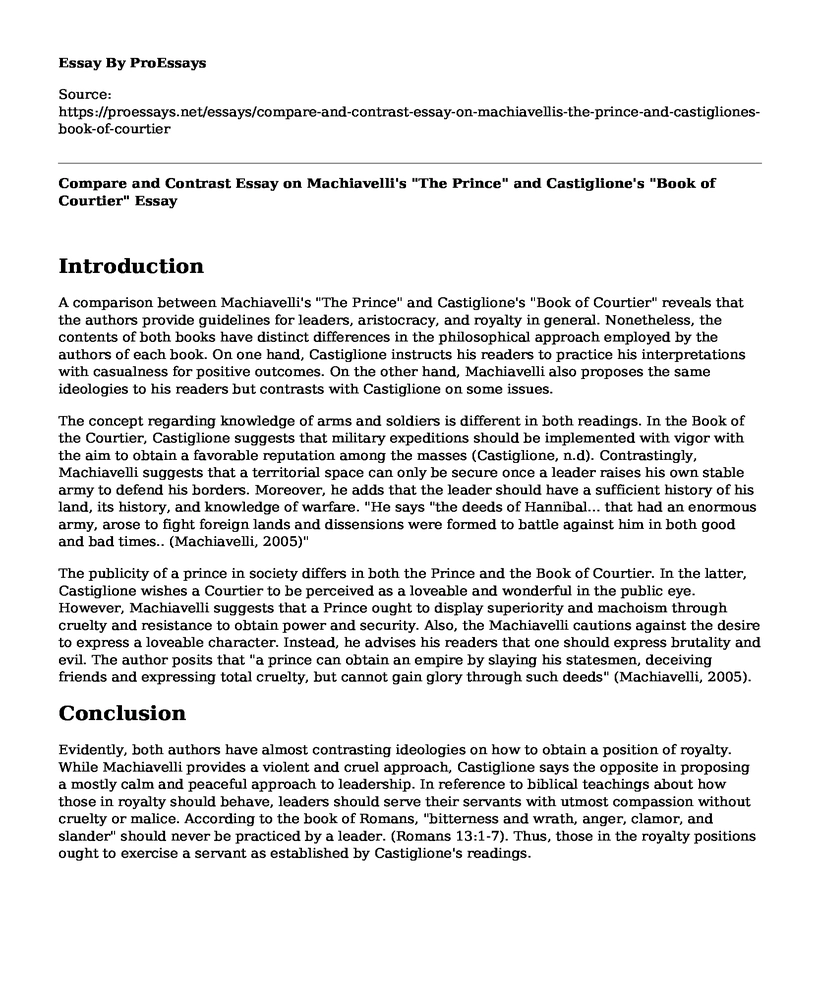Introduction
A comparison between Machiavelli's "The Prince" and Castiglione's "Book of Courtier" reveals that the authors provide guidelines for leaders, aristocracy, and royalty in general. Nonetheless, the contents of both books have distinct differences in the philosophical approach employed by the authors of each book. On one hand, Castiglione instructs his readers to practice his interpretations with casualness for positive outcomes. On the other hand, Machiavelli also proposes the same ideologies to his readers but contrasts with Castiglione on some issues.
The concept regarding knowledge of arms and soldiers is different in both readings. In the Book of the Courtier, Castiglione suggests that military expeditions should be implemented with vigor with the aim to obtain a favorable reputation among the masses (Castiglione, n.d). Contrastingly, Machiavelli suggests that a territorial space can only be secure once a leader raises his own stable army to defend his borders. Moreover, he adds that the leader should have a sufficient history of his land, its history, and knowledge of warfare. "He says "the deeds of Hannibal... that had an enormous army, arose to fight foreign lands and dissensions were formed to battle against him in both good and bad times.. (Machiavelli, 2005)"
The publicity of a prince in society differs in both the Prince and the Book of Courtier. In the latter, Castiglione wishes a Courtier to be perceived as a loveable and wonderful in the public eye. However, Machiavelli suggests that a Prince ought to display superiority and machoism through cruelty and resistance to obtain power and security. Also, the Machiavelli cautions against the desire to express a loveable character. Instead, he advises his readers that one should express brutality and evil. The author posits that "a prince can obtain an empire by slaying his statesmen, deceiving friends and expressing total cruelty, but cannot gain glory through such deeds" (Machiavelli, 2005).
Conclusion
Evidently, both authors have almost contrasting ideologies on how to obtain a position of royalty. While Machiavelli provides a violent and cruel approach, Castiglione says the opposite in proposing a mostly calm and peaceful approach to leadership. In reference to biblical teachings about how those in royalty should behave, leaders should serve their servants with utmost compassion without cruelty or malice. According to the book of Romans, "bitterness and wrath, anger, clamor, and slander" should never be practiced by a leader. (Romans 13:1-7). Thus, those in the royalty positions ought to exercise a servant as established by Castiglione's readings.
References
Machiavelli, N. (2005). The Prince. Icon Group International, Inc.
Castiglione, B. (n.d). Excerpts from Castiglione's: The Courtier. Online. Retrieved from https://www.oneonta.edu/faculty/farberas/arth/arth200/artist/castiglione_courtier.htm. Accessed 25 July 2018.
Cite this page
Compare and Contrast Essay on Machiavelli's "The Prince" and Castiglione's "Book of Courtier". (2022, Jun 30). Retrieved from https://proessays.net/essays/compare-and-contrast-essay-on-machiavellis-the-prince-and-castigliones-book-of-courtier
If you are the original author of this essay and no longer wish to have it published on the ProEssays website, please click below to request its removal:
- Influence of America on the Literary Works of Khalil Gibran
- Character Analysis of Oedipus Rex
- Sylvia as Hero in Sarah Orne Jewett's A White Heron
- Essay Sample on The Hour: Trapped Lives of Women in a Patriarchal Society
- Essay Example on C.S. Lewis: Great Divorce, Realistic Characters
- Essay Example on Odyssey: Homer's Captivating Masterpiece in Modern Times
- Essay Example on The Twelve Greek Pantheons: Immortals of Greek Mythology & Religion







